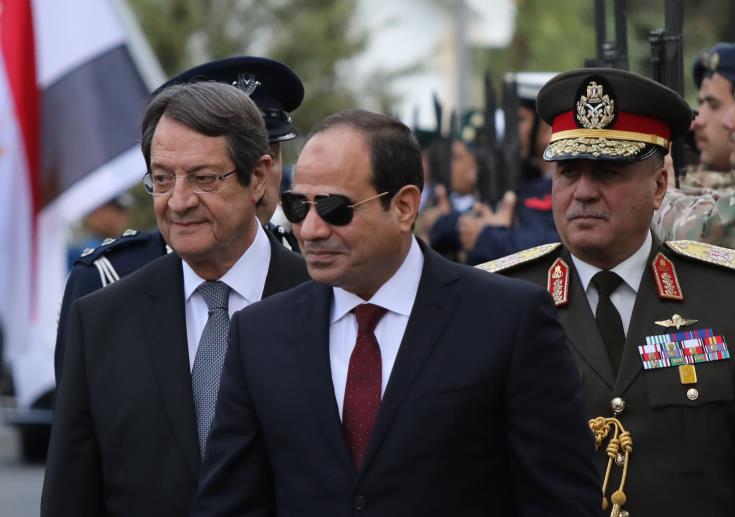By Dr Andrestinos Papadopoulos, Ambassador a.h.
Undoubtedly, it is time that brings deep changes to developments in countries, leaderships, and goals, creating new geostrategic data which respective governments should consider in formulating their policies.
This approach of analysis is dictated by the political doctrine “dans le temps et dans l’espace” (in time and in space).
In the Middle East, the time factor brought about impressive changes.
The analysis which follows confirms this development based on the behaviour of regional powers and the existing rivalry between the Arab countries (Saudi Arabia, UAE, Bahrain, and Qatar), Israel, Iran, and Turkey, as they aim at the expansion of their influence in the region.
Even the United States remains an active player in this respect.
Traditionally, it is Saudi Arabia, the custodian of the holiest religious cities of Mecca and Medina that exercises the leadership of the Sunni Arab world, based on its oil wealth, its privileged geographic position, its strong opposition to the annexation of the Palestinian lands by Israel and support of the Palestinian struggle, as well as its vehement opposition to Shiite Iran’s geostrategic ambitions.
Recently, low prices of petrol, the war in Yemen with its economic consequences, foreign policy moves by the UAE and Bahrain to normalise their relations with Israel, led Saudi Arabia to have second thoughts and explore the possibility of normalising relations with Israel and Qatar.
It should be mentioned that the Emirates actively support the Libyan National Army against the Government of National Accord supported by Turkey and Qatar, encourage the enhancement of Gulf relations with the Eastern Mediterranean Gas Forum against Turkey’s expansionist policies in the Mediterranean, and concluded a deal with Israel to use the ports of Eilat and Ashkelon to transport oil to Europe.
The apparent political and economic benefits, deriving from rapprochement with Israel prompted Riyadh to seek U.S. intervention for the achievement of this goal.
In December 2020, a U.S. delegation visited Riyadh to promote initiatives of diplomatic normalisation of ties between Saudi Arabia And Israel, as well as the settlement of the dispute between the Gulf countries and Qatar which led to the 2017 crisis.
Such a development would have contributed to regional stability and the strengthening of U.S. efforts to create a common front against Iran.
As an additional incentive, it was reported that Saudi Arabia could be accepted as a joint custodian of the Al Aqsa mosque in Jerusalem.
If realised, such a development would certainly increase the prestige of Saudi Arabia in the Islamic world and allow Riyadh to have a say in any future Israeli-Palestinian peace negotiations.
Normalisation of relations with Israel and Qatar would result in isolating more effectively Saudi Arabia’s rivals in the region: Iran and Turkey.
Iran, through the creation of the Tehran-Damascus Hezbollah axis, the use of the Shiites of Baghdad and the reported support given to the Houthis in Yemen acquired a strategic influence in the Middle East, aiming at countering Israel and Saudi Arabia.
Any change, therefore, would create difficulties to Iran, because, apart from the sanctions against it and the internal turmoil any partnership of Arabs with Israel would create the paradox to have Iran isolated, whereas in the past it was Israel that was facing the enmity of the Arab states.
Reacting to this situation, Iran could portray itself as the only defender of the Palestinian cause and genuine enemy of Israel, which on many occasions it threatened to exterminate, developing its nuclear programme, that it recently decided to upgrade, resuming 20 per cent uranium enrichment.
Turkey, for different reasons, represents a challenge for both Arabs and Israel.
Neo Ottomans
Briefly, we can mention the neo-Ottoman ambitions of Erdogan, staunch support of the Moslem Brotherhood and the calculated efforts to extend its international influence and standing, as it is witnessed by its military presence in Cyprus, Syria, Iraq, Qatar, Libya, Azerbaijan, Albania and seven other countries, within the framework of NATO and the United Nations.
In particular, for Saudi Arabia and Egypt, the projection of Erdogan as leader of the Muslim world constitutes anathema.
As far as Israel is concerned, the antagonism started in 2010, when Turkey tried to break the Gaza blockade and is further nurtured by the efforts of Erdogan to present himself as the champion of the Palestinian cause.
More recently, in September 2020, Turkey hosted reconciliation talks between Hamas and Fatah to strengthen the front against Israel, which she accuses of the annexation of Palestinian lands and the alignment with Arab Gulf states to oppose her aspirations in the eastern Mediterranean.
Recent diplomatic openings of Erdogan towards Israel do not seem to succeed, as at this concrete moment the Arabs count more for Israel.
This is also confirmed by the recent defence agreement between Greece and Israel which constitutes a negative answer to Erdogan’s opening.
Turkey rather envisages the new Biden administration with these openings.
Qatar is the other side of the coin of the diplomatic efforts by the U.S. and Saudi Arabia to build up a front against Iran.
In this case, the endeavour is more complex.
In 2017, the Gulf states severed diplomatic relations with Qatar and imposed an air, sea, and land blockade.
Doha reacting, normalised relations with Iran and became Turkey’s most trusted ally, offering Ankara a military base, financial aid, and favourable trade relations.
However, the efforts deployed by the two mediators in the dispute, the U.S. and Kuwait, yielded results.
As announced recently by the Foreign Minister of Kuwait, the first step has been taken by Saudi Arabia which decided to open its frontiers to Qatar, followed by Egypt, the UAE and Bahrain.
These are, therefore, the changes in the Middle Eastern scene, which are of particular interest to Cyprus.
It augers well, that Cyprus has excellent relations with both Arab states and Israel, especially at this time of radical changes in the geostrategic balances of our region.
The diplomatic efforts of Cyprus to enhance these relations are on the right track.
There is, however, an element which should be taken seriously into account.
This is the Joe Biden factor; he will certainly seek to regain the primary role once enjoyed by the U.S. in the developments of the Middle East.









